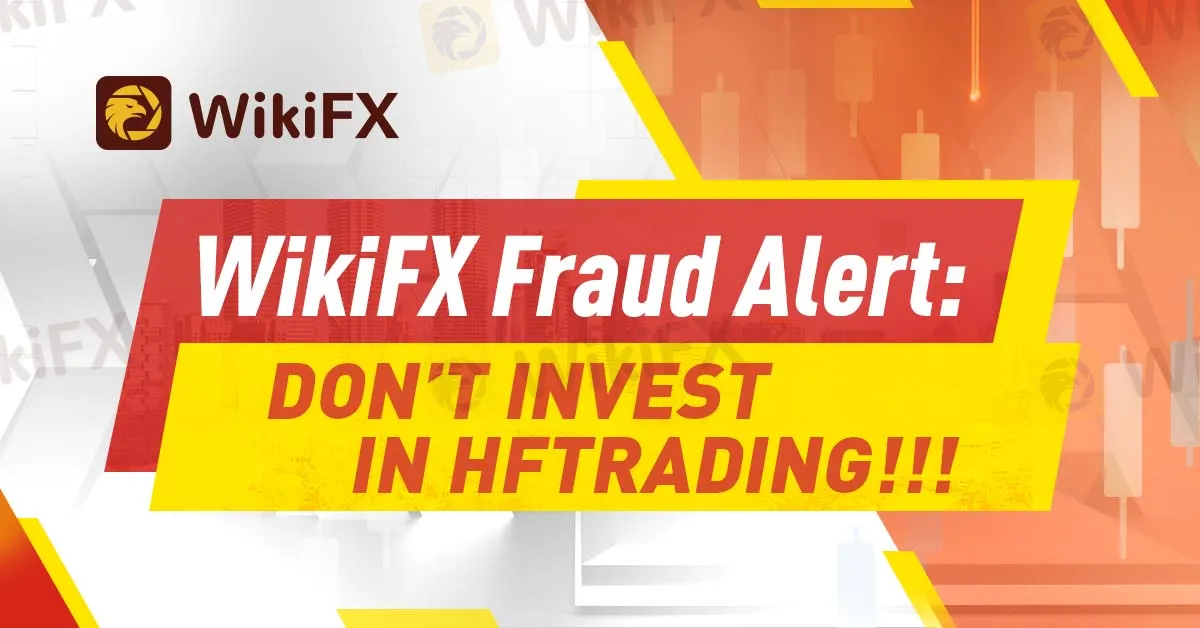简体中文
繁體中文
English
Pусский
日本語
ภาษาไทย
Tiếng Việt
Bahasa Indonesia
Español
हिन्दी
Filippiiniläinen
Français
Deutsch
Português
Türkçe
한국어
العربية
WikiFX Fraud Alert: Don’t Invest in HFTrading!!!
Abstract:The legitimate license is the business license issued by the financial regulatory institution of each country/region.

According to WikiFX, HFTrading has been given a pretty low rating of 1.36/10. In other words, WikiFX doesn't advise people to invest in a broker with a low score.

It is worth noting that HFTrading is verified to be a clone firm. The licensed company it impersonates is a New Zealand company called CTRL Investments Ltd. No doubt, it is risky for traders to work with an unregulated broker as it may take traders money away fraudulently.

What is a Legitimate License?
The legitimate license is the business license issued by the financial regulatory institution of each country/region.
Holding a license means that the broker is recognized and regulated by the regulatory authority, therefore your money is under the protection to some extent.
Whether a forex brokerage firm holds a legitimate license or not is one of the important factors to evaluate the reliability of forex brokers.
The content of the regulation and the difficulty of obtaining a license vary with the country and agency issuing the license.
What is WikiFX?
WikiFX is a global broker regulatory inquiry app that holds information of over 35,000 forex brokers in collaboration with 30 national regulators. Here, traders can find verified details of a certain forex broker before engaging with them. Visit WikiFX's official website at www.wikifx.com. Alternatively, download the free WikiFX app on Google Play/App Store.

Click on “All” in the mobile app.

Move to the “Regulation Institute”. Here is a comprehensive list of regulators categorized according to respective countries.

The Australian Securities and Investments Commission (ASIC) is Australias main corporate regulator.

On the other hand, the Financial Markets Authority (FMA) is the government agency responsible for regulation of financial markets in New Zealand.

Is HFTrading worthy to invest in?
Not only is HFTrading an unregulated brokerage firm, it has even been ruled a clone, which means HFTrading could blow your account and take your money away without your permission. You will hardly be able to hold them responsible for the loss of your funds.
Conclusion
All in all, when you look for a broker to conduct your trading activities with, the thing you need to do is to identify the brokers certification. Unfortunately, HFTrading is a broker that lacks such information. WikiFX does not advise traders to invest in HFTrading. If you want to know more information about the reliability of certain brokers, you can open our website (https://www.WikiFX.com/en). Or you can download the WikiFX APP to find the most trusted broker for yourself.

Disclaimer:
The views in this article only represent the author's personal views, and do not constitute investment advice on this platform. This platform does not guarantee the accuracy, completeness and timeliness of the information in the article, and will not be liable for any loss caused by the use of or reliance on the information in the article.
Read more

Webull and Others Fined $275,000 for Incomplete Suspicious Activity Reports
Webull Financial, alongside Lightspeed Financial Services Group and Paulson Investment Company, LLC, has agreed to pay a collective fine of $275,000 following an investigation by the US Securities and Exchange Commission (SEC). The penalty was issued due to the firms’ failure to include essential information in suspicious activity reports (SARs) over a four-year period.

Alleged Concerns with TradeEU.global's Trading Practices
An individual trader has come forward with allegations of an unfavourable experience while using the services of the broker TradeEU.global.

Lured by False Promises: Malaysian Driver Lost RM218K to an Investment Scam
A 49-year-old e-hailing driver in Malaysia fell victim to a fraudulent investment scheme, losing RM218,000 in a matter of weeks. The scheme, which falsely promised returns of 3 to 5 per cent within just three days, left the individual financially devastated.

Italian Regulator Warns Against 5 Websites
The Italian regulator, CONSOB has issued a warning against five websites offering unauthorized financial services. This regulatory action aims to protect the public from fraudulent activities.
WikiFX Broker
Latest News
Saxo & Portuguese Bank Partnership
SEC Fines Broker-Dealers $275K for Incomplete SAR Filings
Elon Musk Warns of Imminent US Bankruptcy | Bitcoin Retreats from $100K
UK FCA Fines Barclays £40 Million Over 2008 Deal
WikiEXPO Global Expert Interview: Advanced Practices and Insights in Financial Regulation
Justin Sun Invests $30M in Trump-Backed World Liberty Financial
Lured by False Promises: Malaysian Driver Lost RM218K to an Investment Scam
FTX Sets March 2025 Timeline for Creditor Payouts: What It Means for Investors
What is an Economic Calendar? How it works
Pros & Cons of Automated Forex Trading
Currency Calculator


